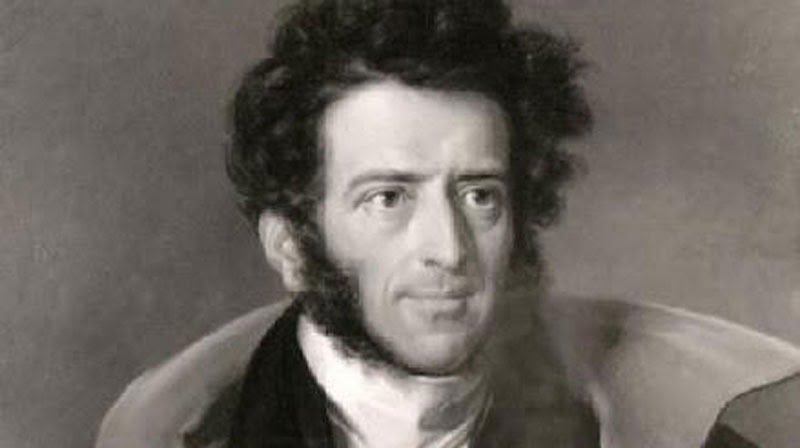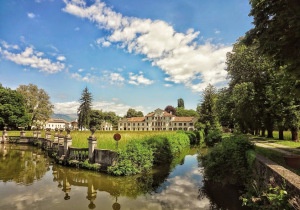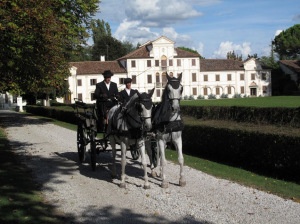
Foscolo. Guest of the Palladian Villas. spoke Venetian dialect.
(From an article by PIo Dal Cin published (Partially) in 2019 on IL GAZZETTINO) This article is published for the first time inits entirety as an exclusive for MARCADOC- The Hills of Venice
“I would say that Foscolo is the emblem of what our Trevigiano Romanticism was then, and therefore a truly moment of splendor and inspiration because there were these patrons who hosted the artists. On the one hand the Toderini in the homonymous villa of Codognè, on the other Isabella Teotochi Albrizzi at the villa Franchetti which was a bit of the “madame d’estelle” and ours, from Treviso, like the German Sturm und Drang which hosted Lord Byron, Isabella Albrizzi hosted Foscolo, therefore a land of inspiration, a land of patronage and hospitality Foscolo began to write the tombs after an interview with pindemonte at villa a franchetti. anthropomorphic, of the man who grants him immortality if he does great things in life. In a large land, it could only have this inspiration. Therefore, Treviso is not only a land of world heritage with the hills of Conegliano and Valdobbiadene, but it is also a land of inspiration “” Luca Zaia, president of the Veneto Region “
WITH GREAT RESPECT, IN SILENCE, AWARE OF ENTERING A “SACRED” SPACE
On tiptoe, as you enter a hall or a theater where the concert has already begun. This is the approach with which we should approach the reading of the life of this Great Poet, of whom we talk much less than we should. To describe his story, his life, his emotions, the fire that burned inside his heart. The “Sacred Fire” which was not only that of poetic inspiration but the one that was often expressed with so much fury in the battles fought in the army, as in the amorous ones, of which he often fell victim.
In opening the container of a past life, it is essential to do it with great respect. Each word must be weighed carefully, as if not wanting to disturb and awaken a rebellious spirit that finally after so many adventures rests in peace in one of the most beautiful churches in the equally wonderful Florence; Santa Croce: We therefore leave the initial description not to summary searches made on the web or on wikipedia, but to a much more authoritative source. Two of his direct descendants agreed to meet a few days ago and draw up this profile of their Avo, of which their noble family keeps the perennial memory: Below, after my reflection you will find their testimony faithfully reported as it was received
WHAT I PERCEIVED OF THE GREAT POET BY READING HIS LIFE: TRAVEL, LOVE, BATTLES
The idea that I got of this great poet while reading the texts that I managed to recover in the library in Treviso is of a fiery, sanguine, fighter and combative young man on all fronts but weak in love. The passion that burned in his soul allowed him to write fantastic odes, poems, letters. But when he turned this fire towards a woman (perhaps a few years later) he was entangled in her, as in a net that he loved and hated. Foscolo was unable to sit still. Wherever he was he had to go somewhere else, to a literary parlor, on a trip to Florence, a city he loved very much. Or he can be found in Switzerland and then in England, where he will die young and then be buried in Florence, in Santa Croce. From his letters it is clear that very often he found himself in financial difficulties. He asked his friends for help. The fate of a great misunderstood, of a genius too tall to be understood by his generation distracted and sleepy in the lounges of the Palladian villas like the one where he stayed in Codognè. A great source of pride for a town of 5300 inhabitants. This, however, was the “rap” of that century. The rich Venetian lords, landowners and often cloth merchants, built their sumptuous villas in the countryside, to escape the heat wave that must have been the city of Venice in the middle of summer. The term “holiday” derives from these stays in the villa. Often they were hunting parties in the countryside full of game and quince. Many others were places of lavish parties and if today we were to have a party in the villa we would invite the rock star of the moment, the great jazz player, or the writer who has just published his latest book. Here Ugo Foscolo was often invited to Codognè and also to Preganziol. He spoke the Venetian dialect correctly, a noble language at that time when the Serenissima had made itself known to the world. One of his ancestors was a member of the Grand Council and admiral of the Serenissima in 1200. Ugo’s father whose real name was not this was a doctor. He had studied in Padua. He died when Ugo was very young. The trip with mother and sister to Venice soon turned into hours and hours spent at the Marciana library where our little hero (who did not like to study at school)
he gave to the study of the Greek classics of which he felt the atavistic attraction since he was born in Zakynthos, an island of Greece. Handsome, passionate, good at writing, quick to fall in love and get lost behind a skirt. A great poet, a nice and courageous man, and I, as an inhabitant of Codognè, can only be proud to know that one day, in 1796, Foscolo shared the sky of our country, looking at a new moon over the mutera or a sky starry waiting for a star to fall that would carry him once again in the arms of Isabella Teotochi Marin Albrizzi, the Muse who opened the doors of “paradise” to him
REPORTING TO THE LETTER THE TESTIMONY OF THE DESCENDANTS OF THE GREAT POET WHO LIVE IN VENETO
“The Foscolo family has remote origins and was made up of different branches; the poet Ugo Foscolo belonged to a branch of the Foscolo family. Around the end of the 1300s, early 1400s, the branch of the Foscolo family moved to Candia (as the island of Crete was called by the Venetians) where the Foscolos remained until the Ottoman Empire conquered the island in the middle from the 1600s, following the invasion of the Turkish armies, the members of the noble Venetian families who lived in Crete and, among them. the branch of the Foscolo family also moved to the Ionian islands. In particular, the family of origin of Ugo Foscolo moved to the island of Zakynthos where the Foscolos consolidated their presence.Andrea Foscolo, father of the poet Ugo, who had married a Greek noblewoman, Diamantina Spathis, dedicated himself to the liberal arts, and in the Specifically, he studied medicine at the University of Padua. After graduation he was appointed head of the city of Split during the period in which it was under the dominion of the Republic of Venice. Andrea Foscolo died young, not even forty leaving his wife and four children, one girl and three sons, including Ugo Foscolo. When the young Foscolo turns 14, with his mother Diamantina, brothers and sister, he leaves the island of Zakynthos and moves to Venice and precisely in Calle delle Gatte. From this moment the poet’s life is consigned to history and literature. It is not clear how Ugo Foscolo learned the Italian language, at home he spoke mainly Greek, his mother tongue, when the family moves to Venice the young Foscolo learns and uses the Venetian dialect, it is likely that, through reading books, he has refined knowledge of the Italian language. Now the branch of our family descends from Admiral Almorò Foscolo, who in 1200 was at the head of the Navy of the Venetian Republic and was part of the Senate of the Maggior Consiglio, to which, starting from the end of 1200, the belonging of the family was confirmed Foscolo. Although belonging to a different branch, our family owned some manuscripts and a painting portraying the Poet; these were kept in the Lancenigo country villa. The companion of one of my great uncles also lived in the Lancenigo villa, with her sisters. On her death, the sisters left the Lancenigo villa, taking the original painting and manuscripts with them. Giancarlo Foscolo. Isabella Foscolo.
FOLLOWING THE TESTIMONY OF THE BONICELLI FAMILY – CURRENTLY OWNER OF VILLA TODERINI IN CODOGNE

The splendid VILLA PALLADIANA where the POET stayed is flanked by a wonderful Bed & Breakfast obtained from the original BARCHESSA of the villa itself. A true bijoux made up of rooms with great attention to detail that offer the guest total comfort in the quiet of the Venetian countryside. The reason why the Venetian nobles loved to build their SUMMER VILLAS in the countryside was to get away from the frenzy of the SERENISSIMA to take refuge in more peaceful and serene places where to practice hunting. A sort of ante literam “vacation”.
in 1600 they were admitted to the Maggior Consiglio acquiring the noble title of counts, they commissioned the architect Frigimelica to build the residence.
It was built in a portion of land surrounded by countryside, therefore out of the context of what was the center of the village. In addition to the land for the construction of the house, the Toderini family invested in the purchase of fields to cultivate. We like to think that already at that time their arrival in Codognè led many to move to this small town to look for work within the estate and consequently increasing its development with houses, grocery stores and various activities and favoring the livelihood of large peasant families.
In a short time, the owners, together with the commercial activity, consolidated the Villa as a holiday resort by giving hospitality to a literary circle in which famous people such as Ugo Foscolo took part. It was a living room that attracted an entire social class.
Who initiated this tendency to favor the arts and letters was Ferdinando Toderini collector of odes and sonnets composed by emerging poets.
In 1796 Countess Maddalena Toderini Pappafava hosted Foscolo. During her stay he wrote the song “La Croce” and the ode “My time” on the occasion of the monastication of Countess Marietta, Magdalene’s sister. The poet himself, in order to support himself and make himself known in the “good” society, repaid his stays by writing essays and odes to the families who welcomed him.
The “Foscolo room” is one of the rooms with the most evocative and breathtaking view of the park in front of the Villa and this has certainly influenced the drafting of his works
Villa Toderini was seriously damaged by bombing during the First World War and later rebuilt in its structural parts and finishes. During the Second World War it became the seat of the German command, was sacked and part of the original furnishings burned.
The family’s desire to get back on the game and revive this jewel has never had a moment of hesitation. Over the years it was then inherited by the Ferracini – Ton lineage and to follow up to the present day by the Bonicelli family, all attracted by the desire for everyday life that still breathes in this house today.
Remembering his father in his countless travels around the world, it is legitimate to think that at the end of his life he found the landing place he had sought in his wanderings in his maternal home.
The Villa exerts a fascination on all of us.
Yes, the Villa has a heart, it always has. It is for this reason that we speak of Love.
At sunrise and sunset, the windows open and close as in any house, this is the signal that life goes on and that no day is the same as another, one more day that is added to the springs of this abode.
Hospitality, a noun that has always been in the DNA of our family for generations, which, with cordial generosity, has welcomed and treated guests, acquaintances and friends from all over the world, starting with illustrious personalities such as Foscolo and still today offers a reception service at the ‘Villa Toderini farmhouse.
Now it is up to us three brothers, Pier Luca, Pier Francesca and Pier Leonia, together with their mother, to pass on to our children the sense of duty and sacrifice to keep this priceless heritage alive. It was given to us, a gift is given with the heart, confident that it will be cultivated with Love. “
THOMAS TODERINI’S TESTIMONY OF THE GAGLIARDIS DELLA VOLTA

The memory of the descendant of the owners of the Villa Thomas Toderini of the Gagliardis della Volta echoes their memory: “Nobility by definition, is a term that takes to itself the set of the highest and most sublime actions and it is no coincidence that the noble salons have been the scene of artistic expressions of various kinds. The Venetian patrician Toderini, although still descendants of the noble and oldest family of the Palatine counts “Gagliardis dalla Volta”, were certainly protagonists of that Venetian eighteenth century, from which they could not escape in terms of the pomp and the custom of surrounding themselves with artists of all culture, from music, to literature, to painting and up to the architecture so well expressed by the magnificent Villa which today represents the beating heart of Codognè.
Tradition has it that these noble residences, an object of entertainment, but also an expression of dominion, were partly intended to accommodate cultural events, where it was customary to meet to share the taste for beauty: in a certain way, we could say that the Venetian Villas were forerunners of modern cultural circles.
The various branches of my family, therefore, have the pride of having hosted in their estates, distinguished artists including Ugo Foscolo, who of a certainly notable family, little more than a boy was a guest on some occasions of our patron branch in Codognè.
Testimony of Ugo’s stay in Codognesi, they come to us through a couple of odes written by the great poet in 1797, on the occasion of the sacred vesting of Mary, daughter of H.E. Ferdinando Toderini de ‘Gajardis, who naturally passionate about poetry and literature, loved to surround himself with the artists of his time in that wonderful theater of daily life that Codognè still knows how to embody so well today.
At the time Ugo Foscolo was little more than a boy, just 19 years old, but he had already given enough display of culture and wisdom, so much so that he was desired by Toderini, one of his most appreciated guests, and still today I love to imagine moments of meeting recite lyrics in the halls of Casa Toderini, but still lovely walks among the vineyards and the “Mutera” which still today whisper the lightness of good living in the villa … “
THE TESTIMONY OF THE WRITER GIORGIO LEONARDI
The writer Giorgio Leonardi has just published a biography on Ugo Foscolo and summarizes his character as follows: “Foscolo is an extremely fascinating figure, and above all very modern in the multiplicity of his expressions. The scholastic heritage often gives us the image of an austere and gloomy man, but Foscolo was much more. In my
biography on the poet of Zakynthos (“Ugo Foscolo. Enterprises, loves and works of a rebel”,
published last year by Edizioni della Sera), through letters and testimonies, ne
I have obtained a largely unpublished portrait. In fact, I wanted to tell, in addition to
great man of letters, even man with his frailties, his torments, his
temperamental intemperance and his many controversial loves (including the one with the
“Venetian” Isabella Teotochi Albrizzi). But Foscolo was also a very man
generous, with the courage of his own ideas. A man who never hesitated to
challenge the power of the moment, without making calculations, paying the consequences with
isolation, exile and misery. It is no coincidence that Mazzini called him “the father of
all the exiles “. From a young age, as a patriot and a Jacobin, he led a wandering life, a
because of his early political stances, perpetually on the run before in
Italy and then abroad. During his countless stays he never stopped in
long, and this complicates the biographer’s task in search of often fleeting traces of the gods
fleeting movements of this rebellious man. Even before being Italian, he was
Venetian by adoption (his native Zante was then a protectorate of the Serenissima), e
in the Veneto he found his first refuge, on the Euganean hills: place where it begins, not a
chance, the tragic autobiographical story of Jacopo Ortis in the novel of the same name
youth. It is always commendable to add pieces to the literary and political itinerary of
this extraordinary wanderer, documenting every stop on his pilgrimage,
because this means returning further remnants of humanity to the life of Ugo Foscolo.
Short and very troubled life, however, ended in a London hovel, in poverty e
in almost total solitude. A miserable fate, in life, for a giant of history, who alone
post mortem she found rest in his wanderings, when the great exile was able to return
permanently at home, to rest forever in a Florentine chapel, surrounded by
what he himself called “the urn of the strong”
(The texts and photos of this article (except of course the portrait of the Poet) are copyright 2021 di pio dal cin-reproduction, even partial, of the reserved text is forbidden)
http://www.villatoderini.com/

